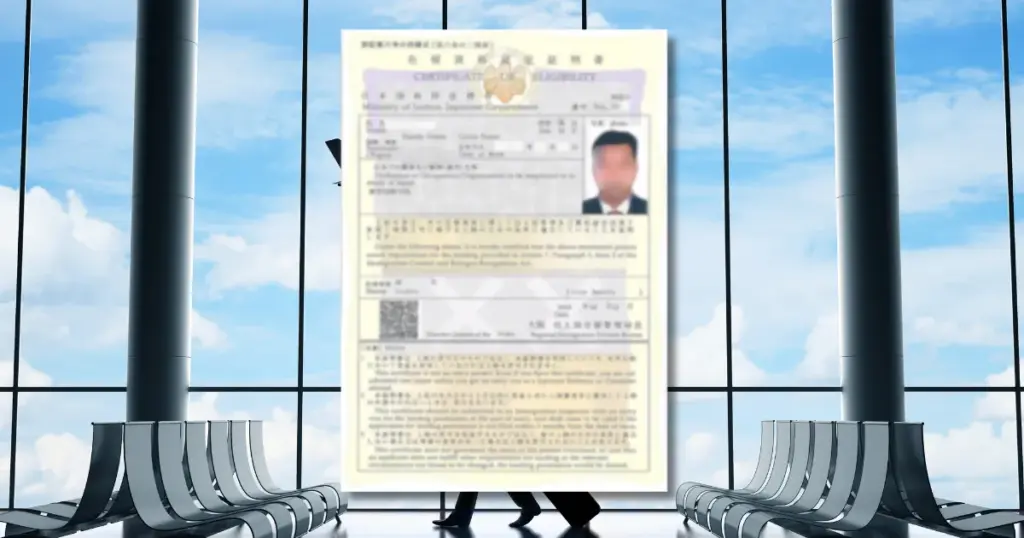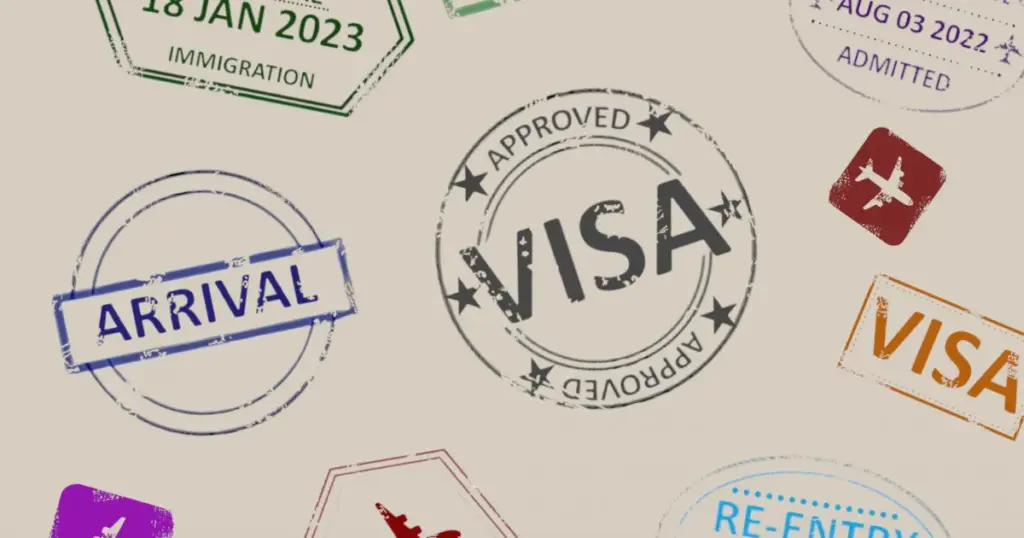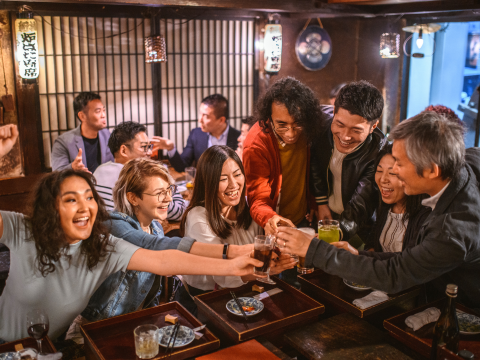Certificate of Eligibility (COE) in Japan – Complete Guide 2025

Certificate of Eligibility Japan – What It Is and Why It Matters

The Certificate of Eligibility (COE) is the foundation of many long-term visa applications for Japan.
Issued by the Immigration Services Agency under the Ministry of Justice, it certifies that a foreign national’s planned activities meet immigration standards.
With a COE, the actual visa application process at an embassy or consulate abroad is faster and smoother.
Definition of COE
Understanding the definition of COE helps applicants distinguish it from other visa documents.
It is essentially a pre-approval issued in Japan before you submit your visa application abroad.
This means the immigration authorities have already examined your case in advance.
Difference Between COE and Visa
Many applicants confuse the COE with a visa, but they serve different purposes.
The COE validates your eligibility, while the visa grants permission to enter Japan.
The following comparison highlights their differences:
| Item | Certificate of Eligibility (COE) | Visa |
|---|---|---|
| Issued By | Immigration Services Agency (Japan) | Japanese Embassy or Consulate abroad |
| Purpose | Confirms eligibility for residence status | Grants permission to enter Japan |
| Applicant | Sponsor in Japan applies | Applicant applies personally overseas |
| Validity | 3 months from issue date | Depends on visa type |
A COE helps your visa and landing examination proceed smoothly but does not guarantee visa issuance; embassies/consulates still make the final decision.

Please Check out What We Offer 😃
Prices From $120!!
Who Needs a Certificate of Eligibility

Applicants must know whether they fall into a category requiring COE.
Long-term residents and students almost always need one, while short-term visitors do not.
Understanding this distinction saves time and avoids unnecessary procedures.
- Workers with contracts exceeding 90 days
- Students enrolling in universities or language schools
- Family members joining a spouse, parent, or dependent already in Japan
Certificate of Eligibility Application Process

The application process involves cooperation between the applicant and their sponsor in Japan.
While the applicant provides documents, the sponsor submits them to the Immigration Bureau.
A clear understanding of this process prevents delays.
Where and Who Applies
In practice, a Japan-based sponsor (employer, school, or qualifying family member) files the COE on your behalf at a Regional Immigration Services Bureau.
Official guidance confirms that a proxy in Japan can make the COE application; overseas applicants do not file it themselves.
Eligible organizations may also submit COE applications via the Online Residence Application System, depending on their registration status.
Required Documents for COE Application
The list of documents differs depending on visa type, but there are common requirements.
Having these documents prepared in advance ensures a smoother process.
Immigration officials may request additional materials if necessary.
- Completed COE application form
- Recent passport-sized photograph
- Copy of the applicant’s passport
- Supporting documents (e.g., contract, admission letter, proof of relationship)
- Sponsor’s financial documents
Fees and Submission Points
The government fee for a COE application is ¥0 (no charge).
Sponsors may still incur practical costs such as translations or courier services, and private visa agents may charge service fees, but these are not government fees for COE issuance.
Submission is handled in Japan by the sponsor, and online filing is available for eligible organizations; in-person submission is not the only route.
Certificate of Eligibility Processing Time and Validity

Processing times and validity periods are crucial for planning your arrival in Japan.
Applicants should align their schedule with embassy appointments and travel plans.
Any delay in using the COE may require reapplication.
Average Processing Time
On average, it takes one to three months to receive a COE.
The exact time depends on the workload at the Immigration Bureau and the visa type.
Applications made in busy seasons, such as April for students, tend to take longer.
The Immigration Services Agency lists a standard processing time of 1–3 months, which aligns with embassy practice for COE-based cases.
Validity Period of COE
A COE is valid for three months from the date of issuance.
This validity ensures that the visa application abroad is filed promptly.
Applicants should coordinate with their sponsor to prevent missing the deadline.
What to Do If COE Expires
As a rule, a COE is valid for three months from issuance and cannot be “extended”; if it expires unused, you generally need a new application.
Pandemic-era special handling that treated certain expired COEs as valid has ended, and the standard three-month rule applies again.
Coordinate your visa appointment and travel so the COE is used well within its validity.
Certificate of Eligibility for Different Visa Types

Different visa types require tailored COE documentation.
Each category has unique requirements to prove eligibility. Being aware of these distinctions ensures a successful application.
COE for Work Visa Applicants
Work visa applicants need support from a Japanese employer.
This requires the company to prepare extensive documents proving the validity of the employment.
Evidence of the company’s financial health may also be required.
COE for Student Visa Applicants
Student visa applicants rely on universities or Japanese language schools as their sponsors.
Institutions usually handle most of the paperwork, but students must provide financial proof.
Demonstrating ability to pay tuition and living expenses is essential.
- Admission letter from the educational institution
- Bank statements showing sufficient funds
- Scholarship confirmation (if applicable)
COE for Family Visa Applicants
Family visa applicants must provide documents proving their relationship to the sponsor.
Japanese immigration authorities carefully examine these cases.
Financial stability of the sponsor is also a key factor in approval.
Certificate of Eligibility Common Issues and Solutions

Applicants often face challenges during the COE process.
Understanding common issues allows you to anticipate them in advance.
Preparation reduces the risk of delays or rejections.
Delayed Processing
Processing may be delayed if documents are incomplete or if immigration offices face heavy workloads.
Applicants should allow extra time for approval. Early submission by sponsors can minimize delays.
Rejected COE Applications
Rejections occur when documents are inconsistent or when eligibility is not proven.
Immigration officers provide reasons in writing. Sponsors can correct the issues and resubmit.
Lost or Misplaced COE
Losing a COE can cause serious inconvenience.
The sponsor can apply for reissuance at the Immigration Bureau. To avoid this, always use secure international mailing services.

Please Check out What We Offer 😃
Prices From $120!!
Certificate of Eligibility Latest Updates 2025

Immigration procedures evolve regularly, and applicants must stay informed.
Japan continues to modernize its system while maintaining strict screening.
These updates affect both sponsors and applicants.
Digitalization of COE Procedures
Since March 17, 2023, Japan allows electronic COE (eCOE) delivery by email.
For visa application and airport landing, you may present the email itself or a printed copy of the eCOE; paper COEs remain acceptable as printed copies as well.
Sponsors that meet eligibility criteria can also use the Online Residence Application System to file COE applications.
Changes in Visa Categories Requiring COE

Which statuses require a COE is defined under Japan’s immigration framework, and details vary by status of residence.
For example, working and student categories generally require a COE, while Temporary Visitor does not.
Always check the official status-specific pages before preparing documents.
Impact of Policy Updates on Travelers
For applicants, policy changes often result in faster processing once the COE is secured.
However, the review of financial and background documents is becoming stricter.
This balance reflects Japan’s effort to welcome talent while ensuring security.
Certificate of Eligibility FAQ
Questions about the COE are common, especially for first-time applicants.
This section provides short, direct answers to the most frequent concerns.
Reading through them will help resolve doubts quickly.
- How long is a COE valid?
-
Three months from issuance.
- Can I apply for a COE myself?
-
No, only a sponsor in Japan can apply.
- What happens if my COE is rejected?
-
The sponsor may correct documents and reapply.
- Do I still need a visa after receiving COE?
-
Yes, the COE only supports your visa application.
- Is COE required for short stays?
-
No, tourists and short-term business visitors do not need it.
- Can COE be reissued if lost?
-
Yes, the sponsor can request reissuance.
- Does COE guarantee visa approval?
-
No, the final decision rests with the Japanese embassy or consulate.
- What is the fastest way to get COE approved?
-
Submitting complete and accurate documents early.
Final Thoughts on Certificate of Eligibility (COE) in Japan

The Certificate of Eligibility (COE) remains one of the most important steps for anyone planning to live, work, or study in Japan long-term.
It acts as a bridge between your sponsor in Japan and your visa application abroad, ensuring that immigration authorities have already pre-approved your activities.
By preparing documents carefully, coordinating closely with your sponsor, and staying updated on the latest policy changes—such as the shift to electronic COEs (eCOE)—you can avoid unnecessary delays.
Applicants should also remember that while the COE simplifies the process, final visa approval still lies with the Japanese embassy or consulate.



